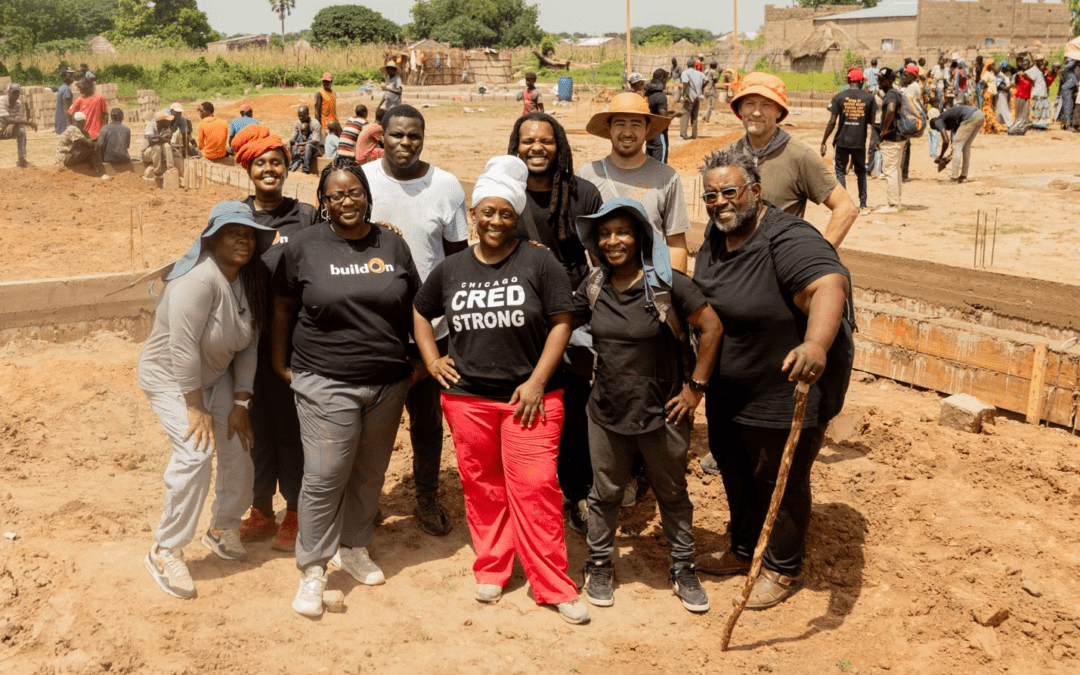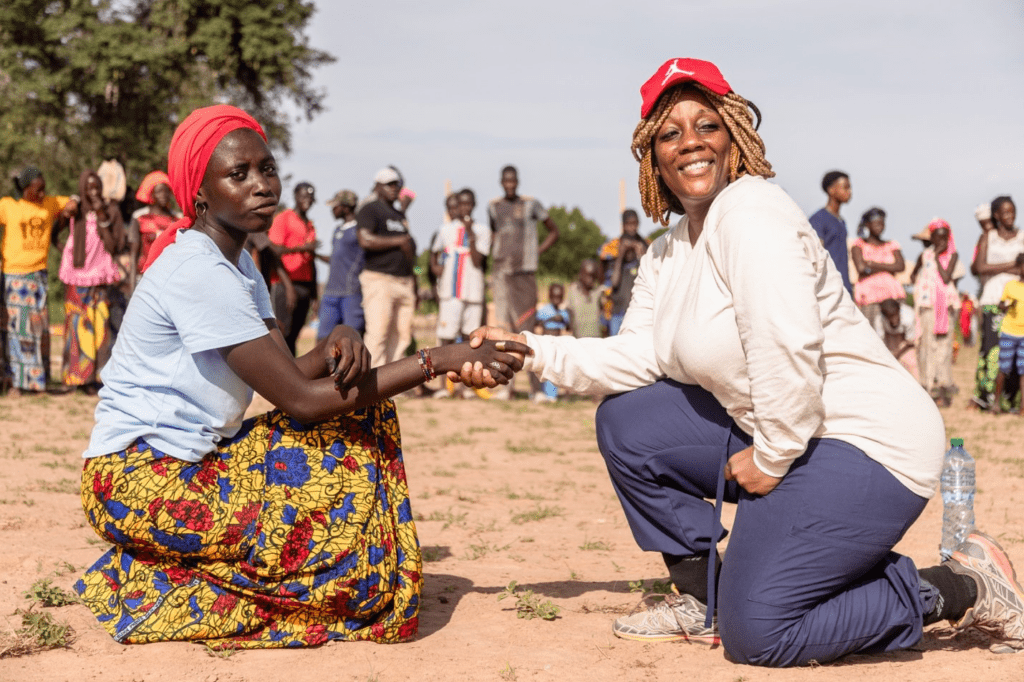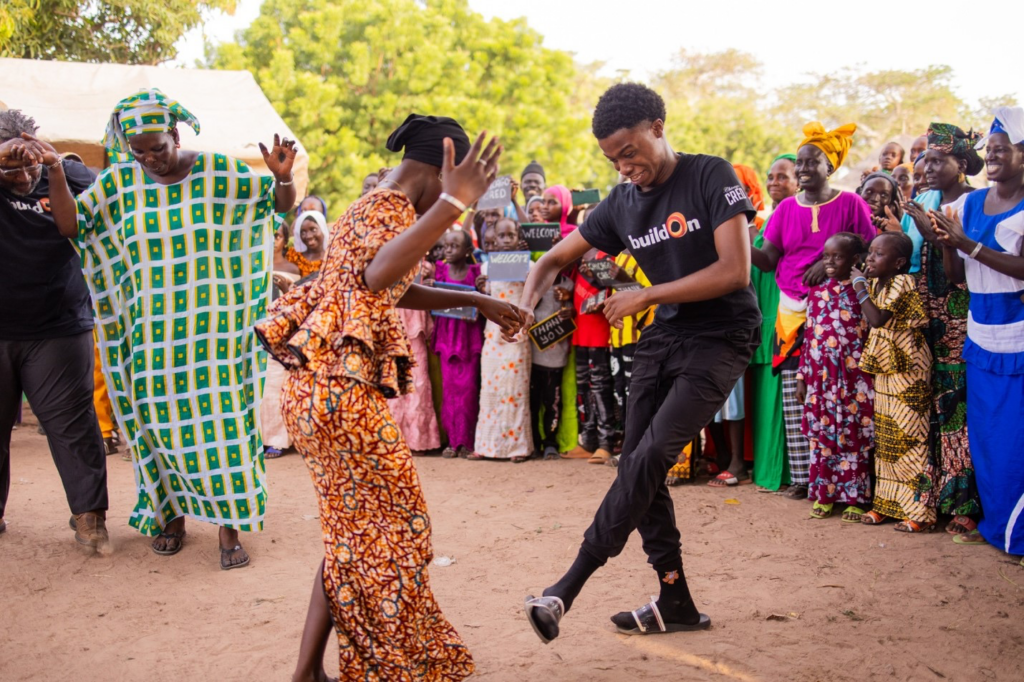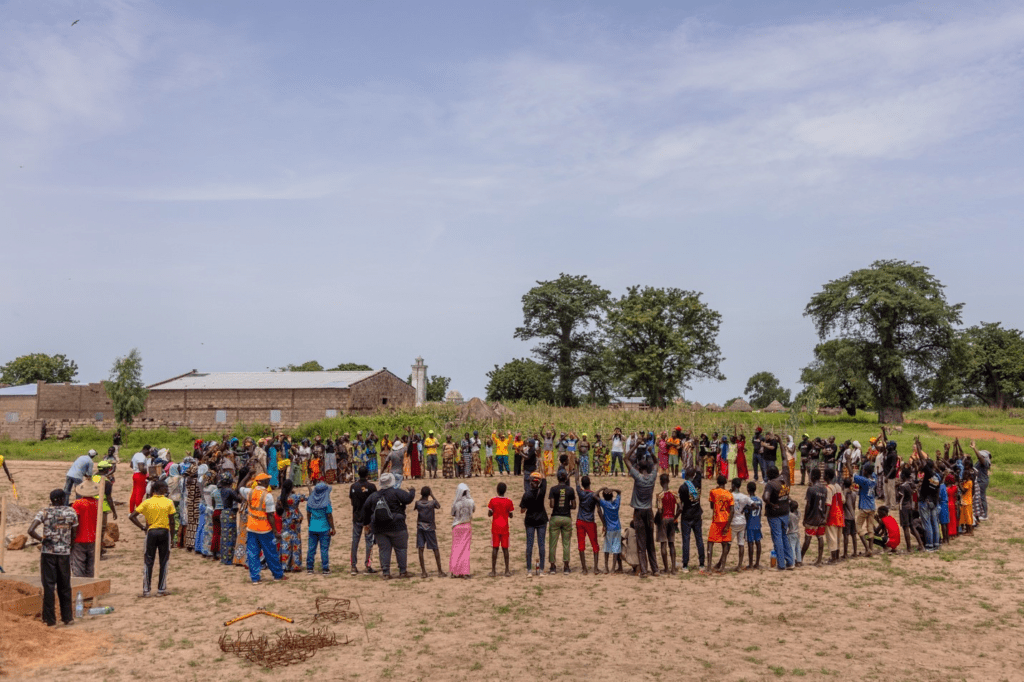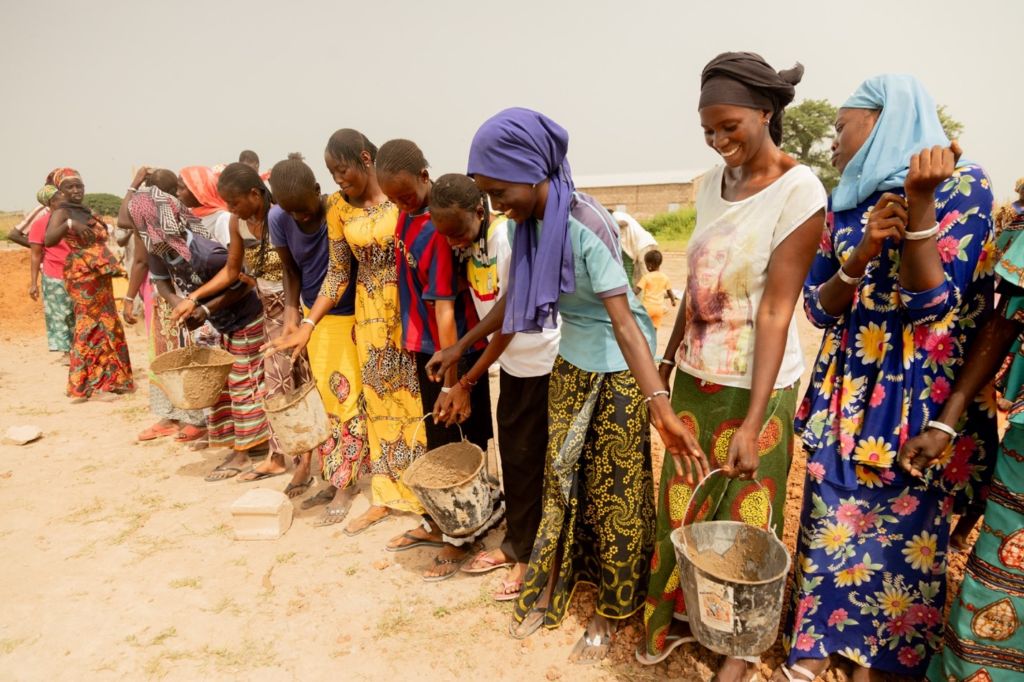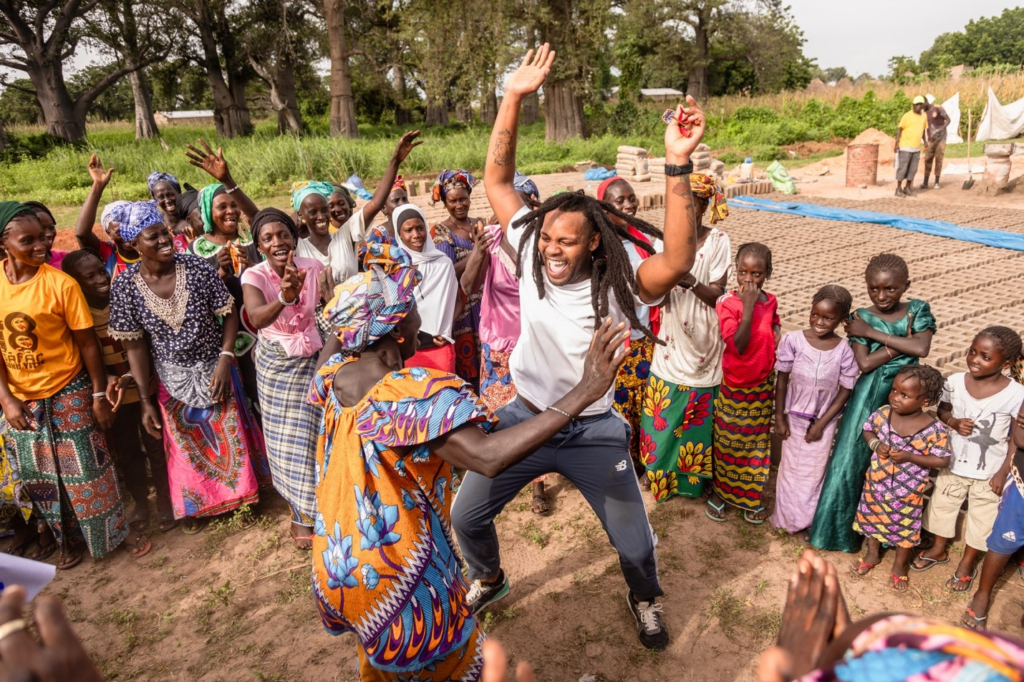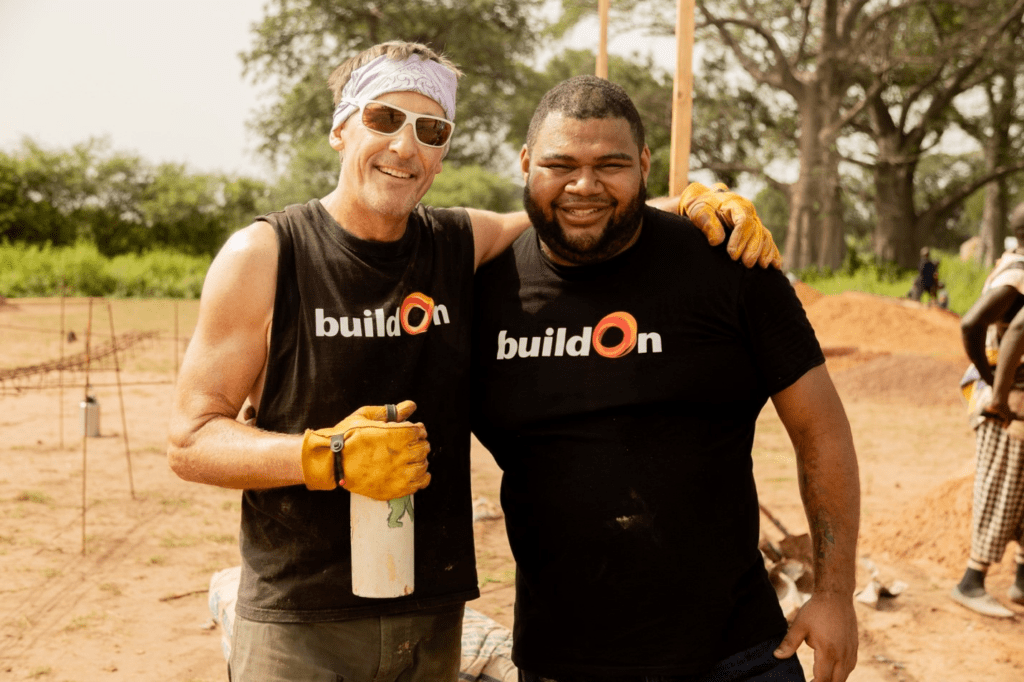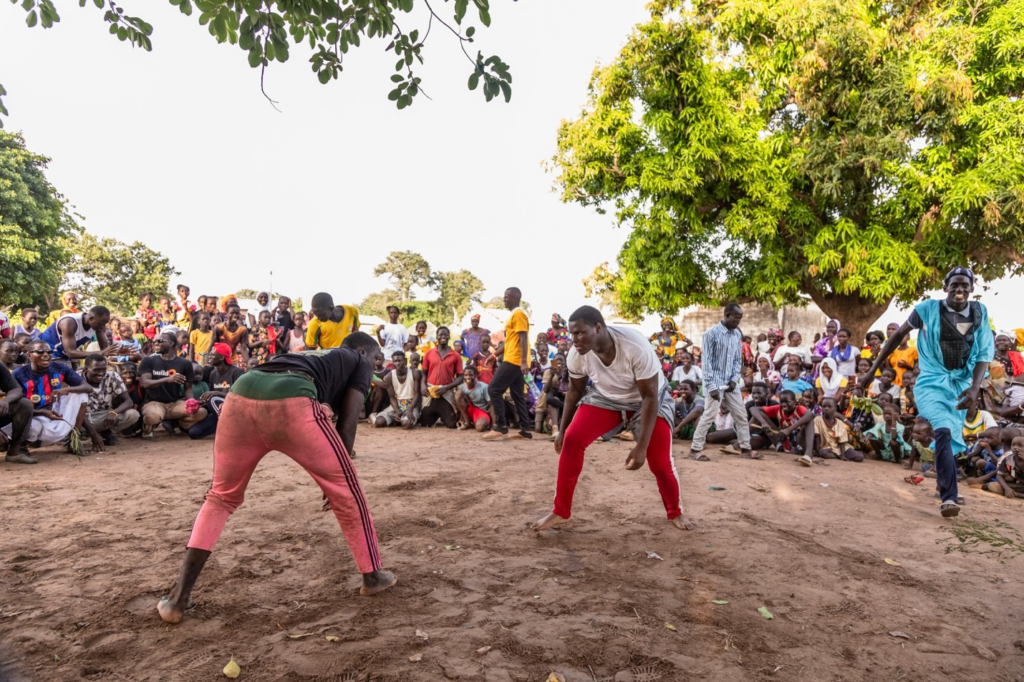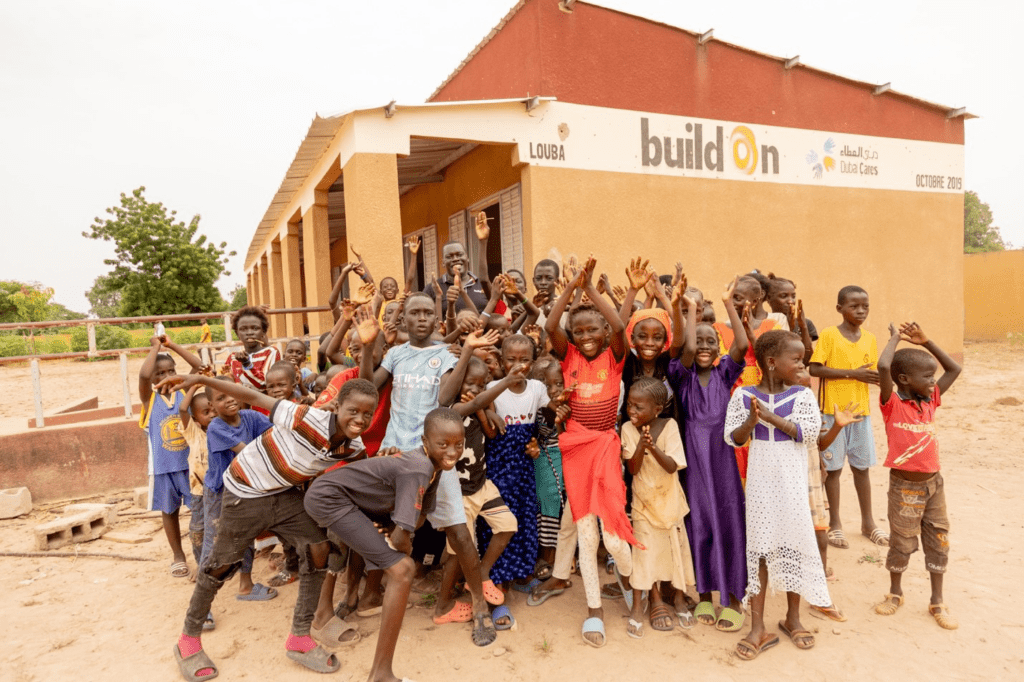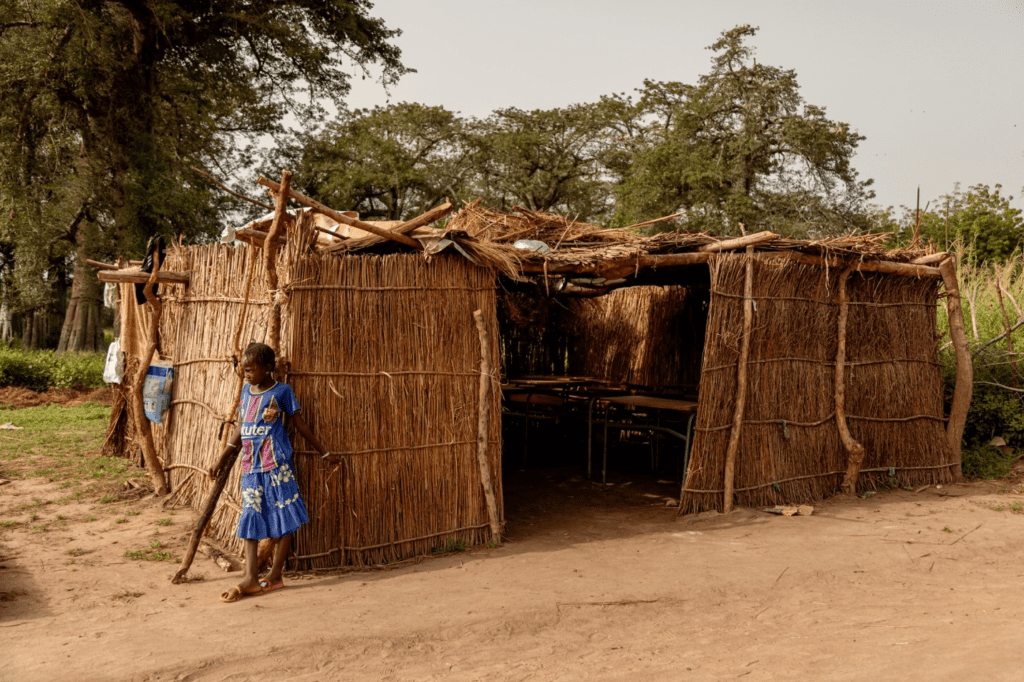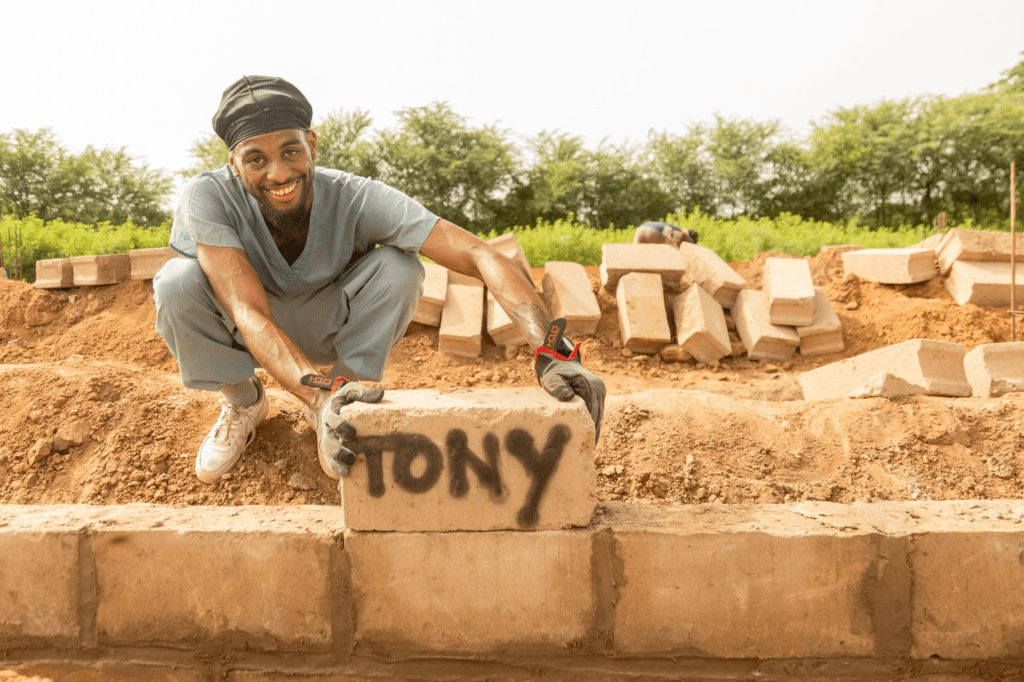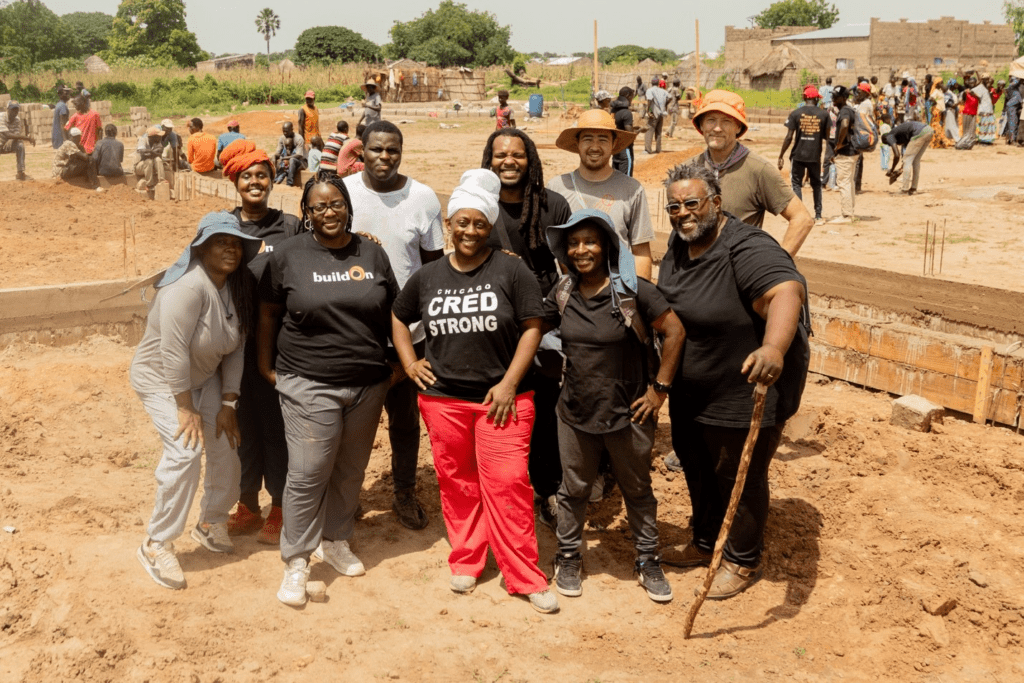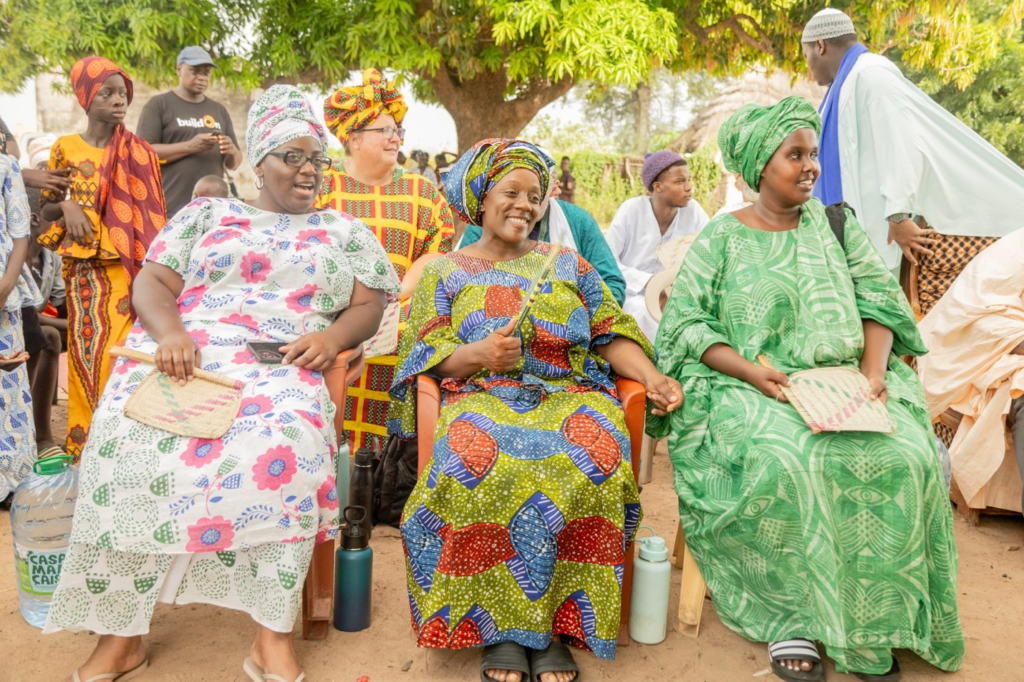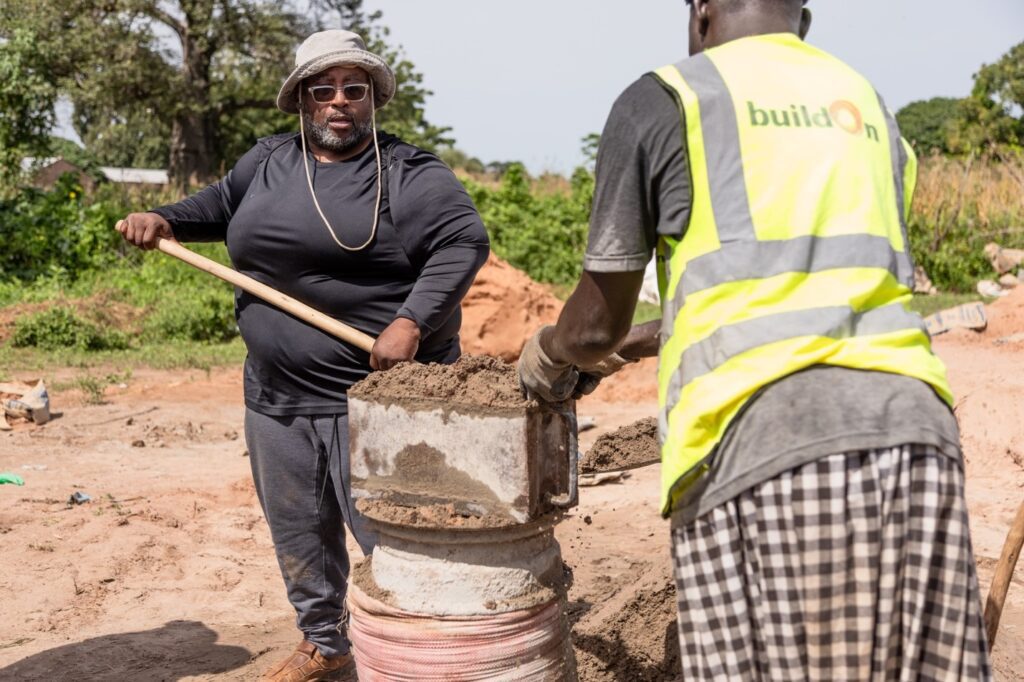“The eye never forgets what the heart has seen.” – African proverb
You can learn a lot about yourself by stepping outside your comfort zone, and the further away you step, the more you can learn.
On September 30th, 13 staff and participants from violence prevention organization Chicago CRED took a giant step out of their comfort zones and boarded a plane for Africa to spend two weeks living in Senegal building a rural school. We worked with a non-profit partner, buildOn, which has built over 2600 schools in eight countries around the world. The experience was exhilarating, inspiring, challenging, exhausting, and above all, fulfilling.
For some of us, it was the first time on a plane. For some, it was the first time abroad. For all of us, it was the first time in West Africa. In every way imaginable, it was unforgettable.
We lived in small family compounds with donkeys, goats and chickens running free. Our hosts spoke no English and, at most, a smattering of French. We slept under mosquito nets on dirt floors covered with thin mats. We ate local food. We bathed outdoors with a pail of water, relieved ourselves in a hole in the ground, and worked in impossible heat.
“We all endured difficult conditions to give the community the gift of education. It was one of the hardest things I have ever done in my life. I’m still recovering but I would do it all again in the name of humanity.”
– Dorothy Wilson – Manager of Clinical Operations and Wellness, Chicago CRED
Day 1 began with a direct flight from Chicago to Madrid, arriving early in the morning before a 10-hour layover.
Day 2 was a flight to Dakar where we were met by Senegalese staff from buildOn. A 60-minute bus-ride brought us to our hotel south of the city. We arrived late and, after a sandwich, collapsed in our rooms—the last bed and shower we would experience for the next nine days.
On day 3, we were back on the bus for a six-hour ride to the small village of Ngouck Diame, about 250 kilometers southeast of Dakar. We arrived in the early afternoon to a spectacular welcome from the entire village.
To the sound of drums and singing, we stepped off the bus and gathered under a large ficus tree at the center of the village. Local women dressed in stunning, floral full-length dresses with matching head pieces grabbed us one-by-one and pulled us into the center of the gathering for impromptu dancing.
After welcoming speeches translated for us by buildOn staff, we made our way to our host families. Despite language barriers, we were welcomed with open arms.
“It was one of the most amazing, selfless cultural experiences I have ever had. We were immersed in rich traditions and greeted with love and breathtaking sights of resilience.”- Shaquita Booker, Site Manager, Chicago CRED
Chicago CRED participants and staff typically lived in homesoccupied by several adult women, numerous children of all ages, and somewhat fewer men, many of whom were away working and sending back money to their families.
Senegal is a mostly Muslim country and in rural, conservative communities like Ngouck Diame, it is normal and allowable for men to have up to four wives. We learned from our research that this practice is partly related to the region’s history where many men were lost to war and slavery. It is also permitted under Islam.
It was not always clear which women were co-wives, which child belonged to which parent, or who were siblings and who were cousins. It didn’t seem to matter. Everyone mingled together and the adults spoke freely and directly to all the children in their native Wolof language, manifesting the well-known African proverb, “It takes a village to raise a child.”
Our buildOn partners fed us separately from our host families because the local diet is extremely limited. The villagers cook outdoors on small barbecue grills—typically just rice, corn or millet. They eat meat only on special occasions.
The group meals gave us the chance to review the day’s activities, plan for the next day, and report on our health conditions. Among other things, buildOn required us to publicly share the frequency and condition of our bowel movements—a level of intimacy none of us were fully prepared for. We quickly adapted and had a lot of laughs listening to each other report out in increasingly descriptive terms.
After dinner, we gathered in the dusk with our host families, watched the children play, and waited for translators to make their rounds so we could ask each other questions. The children were endlessly curious and gleeful. The adults were welcoming and attentive. In addition to sheltering us, they provided water for showering and cleaned our clothes.
On day 4, we woke to the amplified early morning call to prayer emanating from the village mosque. After breakfast, we went to the work site, a short walk from the village center.
Work always began with everyone on site – typically more than 100 people – gathering in a big circle, doing some stretches, reviewing key tasks for the day and cheering each other on like a pep rally. Each day, one of the CRED visitors joined a community member in the center of the circle to lead the morning calisthenics.
We worked on several different tasks. Some made cinder blocks; others bent rebar into various shapes and arrangements; some helped dig a septic system; some pounded red, claylike rocks into gravel to make cement; and some helped dig out the school foundation and begin to lay the bricks and concrete. We designated a water captain to hound us about staying hydrated in the nearly 100-degree temperatures.
The entire village participated. Women created bucket lines to move concrete and dirt, passing the time dancing and singing. Small children carried the empty buckets back to the front of the line. Men did heavy masonry work. The sense of community was palpable.
“I learned that community is most important. I saw what love means for people with the bare minimum necessities and I’m forever thankful.” – Raahsaan Brown, Site Manager, North Lawndale
We only worked in the mornings because the afternoons were simply too hot. After lunch, we spent time under a large tent reflecting on different topics: community, solidarity, courage and resilience. One day, we got into a long discussion about movies.
buildOn was founded 32 years ago by a Michigan native, youthful adventurer and relentlessly upbeat storyteller named Jim Ziolkowski in response to inadequate education systems he had seen first-hand on his global travels. Jim joined us for our “trek” to Senegal. He typically goes on two or three treks per year, believing he is more effective as a leader if he stays close to the work. His organization’s website explains:
“[buildOn]’s mission is to break the cycle of poverty, illiteracy, and low expectations through service and education.”
Several afternoons, we were treated to a cultural event put on by the village. The community gathered under the ficus tree, the drums would start, there was always dancing, and then they would present. One day it was about wedding ceremonies. Another day was about food preparation. One day, they staged a demonstration of Senegalese wrestling.
One of our participants, Durrail Williams, signed up for the wrestling and managed to best the local champion, prompting a chorus of congratulations from the enthusiastic crowd.
Along with all of us, Durrail was given a Senegalese name. After his wrestling victory, he was flocked by local children shouting his Senegalese name, Assane Mbaye, every time he walked through the village.
“When they gave us local names, they really made us feel like we were part of their family. I have so much love for them all.” - Durrail Williams, CRED participant
On day 5 we worked on the school, but on day 6 we took a field trip to another buildOn school a few hours away so we could experience, first-hand, what a completed school meant to a community. Again, the local people came out to welcome us with dancing, drumming, and speeches.
We also gathered in the school with parents to ask each other questions. We learned that many rural Senegalese children only attend Qur’an schools where they memorize the holy text in Arabic. Few learn to read and write unless a school is built. In our village, the existing school was a one-room bamboo shack.
We also learned that attendance in school is strictly required. In fact, if students missed school, their parents were fined. While this struck us as a little extreme, it reflected their determination to educate their kids.
When asked to describe the purpose of education, one local woman said it’s about “power.” She went on to talk about her children finding opportunity in Dakar, in America, and elsewhere across the world.
“The work I have done here will change lives to come.” – Brendan Taylor, CRED Alumni
Afterwards, we returned to our village and, for the next four mornings we worked on the school.
“I learned the true essence of community while I explored the rich culture of Ngouck Diame. This journey was a gift to remind myself that education is not only powerful, but it is also influential.” - Faduma Sheikh-Abdi, Youth and Family Therapist
The CRED delegation originally included 16 people, but two participants dropped out during the training sessions we held in Chicago. Tragically, another participant named Tony Johnson, was killed on September 5, just a few weeks before we were set to go.
Tony’s death was a huge setback for all of us and especially to one of his closest friends, Keianti Darling, who was so distraught that he almost bowed out of the trip. In the end, Keianti not only made the trip but spoke publicly and eloquently about how much Tony and the trip meant to him:
“This trip changed me and opened my eyes to a new life. It made me stronger than I thought I ever was. The love I felt was unbelievable.”- Keianti Darling – Chicago CRED Participant
When our buildOn partners learned of Tony’s death, they asked the village if we could dedicate the school to him and they enthusiastically agreed. Tony’s simple, inspiring definition of service was also printed on the back of our buildOn tee-shirts:
“Being of service means pouring love into something or someone.” – Tony Johnson
For the next four days, we ate, worked, hung out with our families and settled into village life as best we could. We endured oppressive heat and the absence of creature comforts like cold drinks, junk food, plump mattresses, and air conditioning. We bonded with each other and with our hosts, played soccer with the kids, taught them games, and learned enough of the local Wolof language to communicate a few simple ideas.
“Daffa tangoon!” (“It was hot!” in Wolof)- Jack Jomarron, CRED Policy Analyst
One of our most interesting cultural experiences was when the CRED men met with men from the village and the CRED women met separately with a group of local women to talk about issues around gender, family, marriage and everyday life. For the men, the topics ranged from money and work to the challenges of having multiple wives. The women talked about child rearing, their hopes and dreams for their kids, and, in response to our questions, even shared details about their sex lives.
“More than any other conversation, this really gave us a sense of who we are and how much we all have in common. It gave me so much respect and appreciation for the lives of the women in the community.” - Natasha Hall, Clinician
In an especially tragi-comic moment, we were gathered on our last day when one of our buildOn partners arrived with an adorable little goat on a rope. We were prohibited from petting animals due to health risks, but we oohed and ahhed at the cute creature. Then, to our collective shock, our buildOn partner cheerfully announced that the goat was a gift from the village chief to be cooked for our final dinner that night.
The immediate reaction, especially among our CRED women, were squeals of horror. Although most of us had eaten some goat meat a few nights earlier and found it tasty, several passed on it that night with the memory of the frisky little goat fresh in our minds.
Our last night also included a farewell ceremony under the ficus tree attended by the entire village. Our host families dressed us in traditional Senegalese outfits. There was dancing, speeches, hugs and some emotional good-byes.
That night, we also gave gifts to our host families — games for the kids, some educational materials, and fabrics for the women to be made into clothes. The next morning, we were on the bus by 9 and back in our Dakar hotel by mid-afternoon, depleted but enriched.
“I learned to push myself to the highest standards each and every day. The people in the village do it without having anything.” - Joseph Thomas, Participant
We spent two days in Dakar, readjusting to life with beds and showers and gorging on the hotel’s all-inclusive buffet meals. We visited the African Renaissance Memorial, a 170-foot-tall statue at the top of a hill overlooking the harbor. It features a man, a woman and a child pointing west across the ocean—the Senegalese counterpart to our Statue of Liberty.
We also took a ferry to Goree Island, where millions of West Africans were shipped across the Atlantic into slavery. We toured the slave quarters and stood in the notorious “Door of No Return,” where trip leader Reverend Craig Nash conducted a libations ceremony to memorialize the spot where they took their final steps on the continent of Africa.
“I learned from the trip to be grateful and resilient in the face of everything.”
– Faith Newman, Family Case Manager
Our last day included some shopping, resting and reflecting before a late night-flight back to Madrid, another lengthy layover and then the final leg back to Chicago. We arrived in the middle of the afternoon on the 14th day of our trip—relieved and glad to be home, but deeply moved by the experience. During the layover in Madrid, Reverend Nash talked about Chicago CRED’s work in reducing gun violence and how a service trip in Africa contributes to that mission. He said:
“Our work is all about helping guys get to know themselves, be aware of who they are, how to heal from trauma, regulate their emotions, and manage their lives. Everything we teach them was wrapped up in this trip. They saw the meaning of a “village” where everyone cooperates toward a common goal. It gave them a reason to see what’s possible in their own lives here in Chicago. Basically, we gave them a way to celebrate their humanity and love.”
